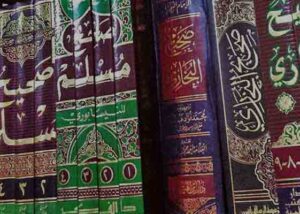Quran
Hadith
Islamic Text
بِسْمِ اللَّهِ الرَّحْمَنِ الرَّحِيمِ
In the Name of Allah Most Merciful Most Kind
Short Answer
Yes, the Hadith about hiding knowledge is authentic. Imam al-Tirmidhi commented that it is Hasan. With regards to the narration in Hakim, Imam al-Dhahabi confirmed that it is Sahih according to the conditions of Bukhari and Muslim.
Explanation
حَدَّثَنَا أَبُو بَكْرِ بْنُ أَبِي شَيْبَةَ، حَدَّثَنَا أَسْوَدُ بْنُ عَامِرٍ، حَدَّثَنَا عِمَارَةُ ابْنُ زَاذَانَ، حَدَّثَنَا عَلِيُّ بْنُ الْحَكَمِ، حَدَّثَنَا عَطاَءٌ
عَنْ أَبِي هُرَيْرَةَ، عن النَّبِيَّ – صَلَّى اللَّهُ عَلَيْهِ وَسَلَّمَ – قَالَ: “مَا مِنْ رَجُلٍ يَحْفَظُ عِلْمًا فَيَكْتُمُهُ إِلَّا أُتِيَ بِهِ يَوْمَ الْقِيَامَةِ مُلْجَمًا بِلِجَامٍ مِنْ النَّارِ”Abu Hurairah (May Allah Most High be pleased with him) narrated that the Prophet ﷺ said: “There is no man who memorises knowledge then conceals it, but he will be brought forth on the Day of Resurrection bridled with reins of fire.” (Ibn Maja, 261).
Imam Ibn Maja narrated this Hadith numerous times (261, 264, 265, 266) with variant wording. As well as narrating from Sayidina Abu Hurairah, he also narrated from Sayidina Anas bin Malik and Sayidina Abu Saeed al-Khudri (May Allah Most High be pleased with them all).
Further, Imam al-Tirmidhi has a similar narration in his (2649). As such, he considered the Hadith to be Hasan. A Hasan Hadith is a sound and authentic narration. Consequently, it is very close to a Sahih Hadith in terms of authenticity.
Additionally, many other leading scholars narrated this Hadith in their collections. This is clear as Imam Abu Dawood narrated it in his Sunnan (3658). Likewise, Imam Ahmad bin Hanbal has numerous narrations with varying chains in his Musnad (7571, 7943, 8049, 8533, 8638, 10420, 10487, 10597).
Lastly, Imam Hakim narrated the above Hadith at least three times (344, 345, 346). This is because he considered the narrations to be Sahih and Imam al-Dhahabi concurred with narrations 344 and 346. Therefore, Imam al-Dhahabi stated that they are sound according to the conditions of Bukhari and Muslim. Furthermore, he added that there is no Illah (defect) present. As such, many other leading scholars of the science narrated the Hadith in their collections too.
Classical Scholars
على شرطهما ولا علة له
It is sound based on their (Bukhari and Muslim) criteria. There is no defect in it. (Imam al-Dhahabi, Ta’leeq on al-Mustadrak).
Imam al-Nawawi has a Hadith collection called Riyadh al-Saliheen. In this collection, he restricted himself to sound or authentic narrations. Thereafter, he included the Hadith above in his collection. Therefore, it is correct to conclude that the Hadith is authentic according to Imam al-Nawawi.
Concluding remarks
Overall, it is very important for Muslims to express a concern regarding Hadith authenticity. This is because our beloved Prophet ﷺ repeatedly warned us against spreading inauthentic narrations about him ﷺ. However, some people seem to ignore this prophetic advice. As such, they behave as if there is no concern with regards to Hadith authenticity. Despite that, we must think: why would the blessed Prophet ﷺ warn against something if it were a non-issue?
Subsequently, the believer should take the words of the blessed Prophet ﷺ seriously and check Hadith before forwarding them. Unfortunately, this is something that must be repeated regularly, since the issue of forwarding dubious narrations is widespread.
And Allah Most High Knows Best.
–Answered by Shaykh Noorud-deen Rashid (18.12.23)






